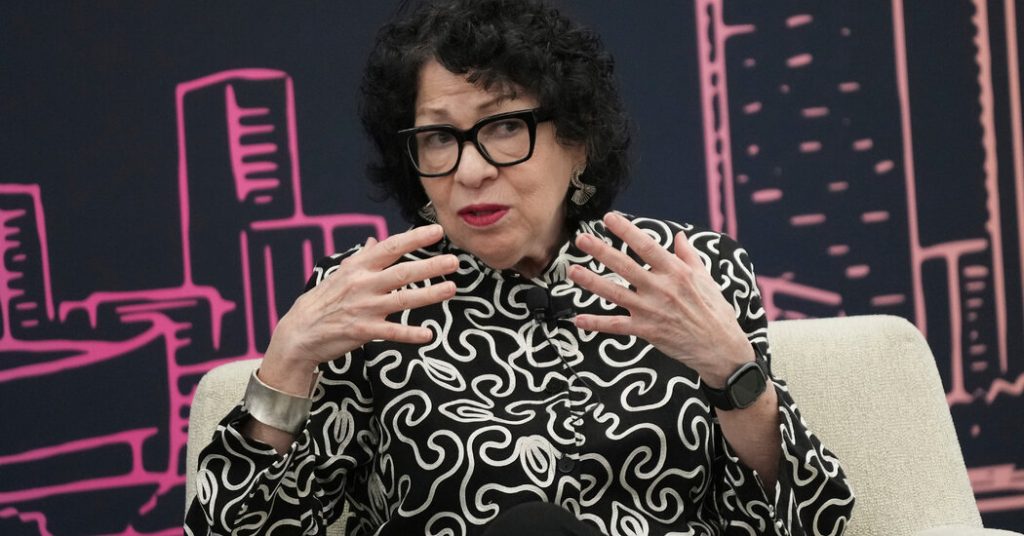The Importance of Checks and Balances
Justice Sonia Sotomayor, during a recent speech at a Florida college, underscored the critical role of checks and balances in the U.S. government. Speaking in broad terms, she emphasized the founders’ intent to prevent the establishment of a monarchy by distributing power among the branches of government. "Our founders were hellbent on ensuring that we didn’t have a monarchy," she stated, "and the first way they thought of that was to give Congress the power of the purse." Her remarks, delivered in the context of President Trump’s executive actions and subsequent legal challenges, took on a particularly poignant significance. The president had recently issued a series of executive orders aimed at curtailing federal programs, leading to numerous legal battles. One federal judge had already ruled against the administration for defying a congressional mandate to release grant money, highlighting the ongoing tension between executive and legislative powers.
Adherence to the Rule of Law
In her address, Justice Sotomayor expressed her concern about the potential for government officials to disregard court decisions. She made it clear that while she expected officials to follow the law, she was not entirely confident that court rulings would always be immediately obeyed. "Court decisions stand whether one particular person chooses to abide by them or not," she noted, adding that "it doesn’t change the foundation that it’s still a court order that someone will respect at some point." This sentiment was particularly relevant in light of the Trump administration’s stance. The president had stated his intention to appeal unfavorable court decisions, while Vice President JD Vance and other administration officials had suggested that some executive actions were beyond judicial review. Justice Sotomayor’s comments reflected a broader anxiety about the erosion of the rule of law and the delicate balance of power among the branches of government.
Historical Lessons on Judicial Prudence
Justice Sotomayor drew on historical examples to illustrate the importance of judicial prudence and the careful management of power. She praised Chief Justice John Marshall for his handling of the 1803 case Marbury v. Madison, which established the principle of judicial review. "The court knew Jefferson wasn’t going to obey that order," she explained, "but it was a very elegant way of avoiding the crisis." She also reflected on past presidential clashes with the judiciary, such as those involving Abraham Lincoln and Andrew Jackson. Despite these historical challenges, she emphasized that the United States has generally upheld the rule of law and maintained its democratic principles. "By and large, we have been a country who has understood that the rule of law has helped us maintain our democracy," she said. However, she stressed the need for the court to proceed cautiously, balancing societal expectations with the need for legal reform. "It can’t get so far ahead of the society that the society rebels and ignores it, but it can’t fall so far behind the society to not do the right thing," she cautioned.
The Role of Judicial Precedent
Justice Sotomayor also addressed the importance of judicial precedent and the potential consequences of overturning established decisions. "We must be cognizant that every time we upset precedent, we upset people’s expectations and the stability of law," she said. "It rocks the boat in a way that makes people uneasy about whether they’re protected or not protected by the law." While she did not name specific decisions, her remarks were particularly resonant given the Supreme Court’s recent reversals of major precedents in areas such as abortion, affirmative action, and administrative law. These changes, she suggested, can undermine the public’s trust in the legal system and create uncertainty about individual rights and protections. Her comments highlighted the delicate balance the court must strike between adhering to precedent and addressing evolving societal norms.
The Dynamics of Judicial Colleagueship
In discussing her relationships with her fellow justices, Justice Sotomayor emphasized the importance of collegiality and mutual respect, even in the face of profound disagreements. "Good colleagues sometimes have silly thoughts, but it doesn’t make them bad or silly," she said. This perspective underscores the human side of the Supreme Court, where justices with diverse backgrounds and ideologies must work together to make critical decisions. Her comments suggested that despite the high stakes and intense debates, the court’s ability to function effectively depends on a shared commitment to the rule of law and the integrity of the judicial process. By fostering a culture of respect and open dialogue, the court can navigate the complex and often controversial issues that come before it.
The Press and Democratic Accountability
Finally, Justice Sotomayor addressed the role of the press in maintaining a healthy democracy. She expressed a sense of nostalgia for the information environment of her youth, characterized by a few trusted news sources, and expressed concern about the current media landscape. "The lack of news literacy these days," she said, "is a looming catastrophe." The internet, she argued, has created extraordinary challenges for the press and the public, making it difficult to distinguish between reliable information and misinformation. "We’re going to lose our democracy," she warned, unless young people take steps to become informed and critical consumers of news. Her message was a call to action, urging the audience, particularly the students present, to prioritize media literacy and active civic engagement. In doing so, she highlighted the interconnected nature of the judiciary, the press, and the public in safeguarding democratic values and the rule of law.












